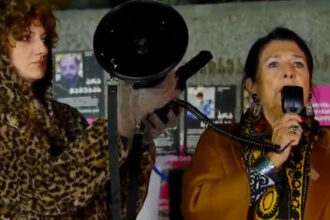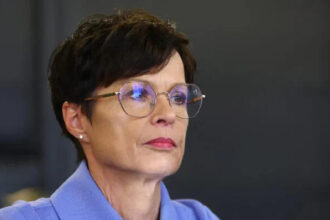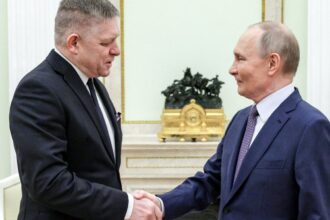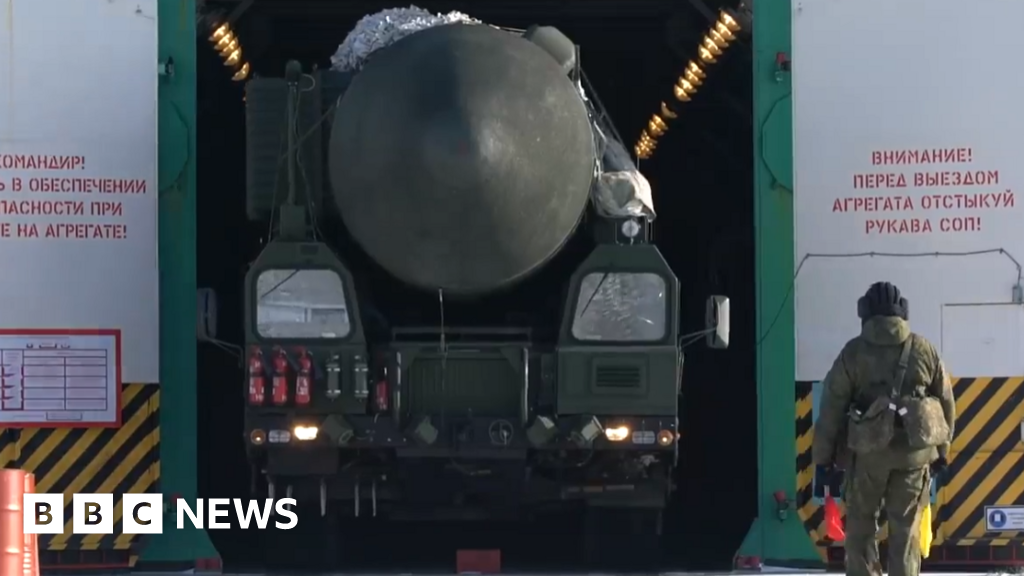**Russia’s Nuclear Forces on High Alert During Ukraine Invasion**
When Russia invaded Ukraine in February 2022, the country’s nuclear forces were put on high alert. Anton, a former officer in the Russian nuclear forces, says his unit was ready to launch a nuclear strike.
Anton met with the BBC at a secret location outside Russia. For his own protection, his name and face have been changed. He showed us documents confirming his unit, rank, and base. While we can’t verify all of his claims, they match Russian statements from the time.
**Life on High Alert**
Three days after Russia’s invasion, Vladimir Putin announced that the country’s nuclear deterrence forces had been ordered into a “special mode of combat service.” Anton says this was already in place on day one of the war. His unit was shut inside their base, with only Russian state TV for information.
**Guarding Nuclear Weapons**
Anton’s testimony gives us a rare look at the inner workings of Russia’s nuclear forces. These units are highly secretive and tightly controlled. Soldiers live a closed-off life, with strict rules and no contact with outsiders.
As part of the security unit, Anton’s job was to guard the nuclear weapons. He says they had constant training exercises and could respond in just two minutes.
**Russia’s Nuclear Arsenal**
Russia has around 4,380 operational nuclear warheads, according to the Federation of American Scientists. However, concerns have been raised about whether Putin could deploy “non-strategic” or tactical nuclear weapons.
These smaller missiles might not cause widespread radioactive fallout but would lead to a dangerous escalation in the war.
**The Updated Nuclear Doctrine**
Last week, Putin ratified changes to Russia’s nuclear doctrine. This now allows the country to launch a nuclear strike if it comes under attack from conventional missiles by a non-nuclear state with the participation of a nuclear state.
Some Western experts have questioned whether Russia’s nuclear arsenal is fully functional, citing outdated weapons from the Soviet era. However, Anton rejects this opinion and says that Russia has an enormous nuclear arsenal, including constant combat patrols on land, sea, and air.
**A “Criminal Order”**
After the invasion began, Anton was given a “criminal order” to hold lectures with his troops using specific written guidelines. These instructions stated that Ukrainian civilians were combatants and should be destroyed – which is considered a war crime.
Anton refused to carry out this propaganda, which led to him being transferred to an ordinary assault brigade in another part of the country. He was told he would be sent to the front line as “cannon fodder.”
**Deserting the War**
Before he could be sent to the front, Anton signed a statement refusing to take part in the war and a criminal case was opened against him. He then fled the country with the help of a volunteer organization for deserters.
Anton believes that many Russian soldiers are opposed to the war. A volunteer organization called “Idite Lesom” has told the BBC that 350 deserters seek their help each month, and the risks are growing.
**A Risky Decision**
Although Anton has left Russia, he is still at risk from security services there. He takes precautions and works off the books to avoid being caught.
By helping other soldiers flee, Anton puts himself in danger of being killed. However, he continues to do so, hoping that his actions will show the world that many Russian soldiers are against the war.
Read More @ www.bbc.com




